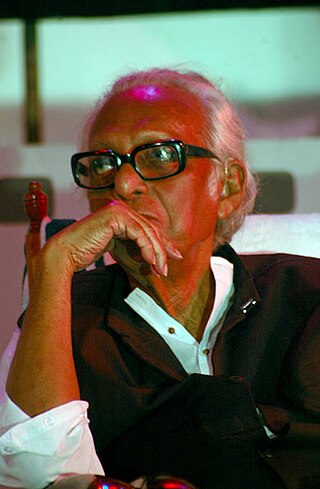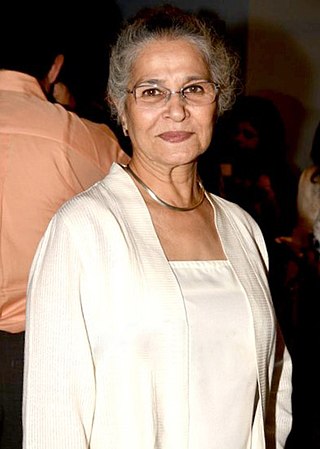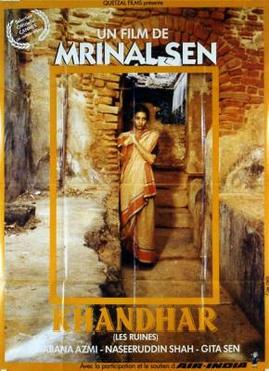
Mrinal Sen was an Indian film director and screenwriter known for his work primarily in Bengali, and a few Hindi and Telugu language films. Regarded as one of the finest Indian filmmakers, along with his contemporaries Satyajit Ray, Ritwik Ghatak, and Tapan Sinha, Sen played a major role in the New Wave cinema of eastern India.
The National Film Award for Best Direction is an honour presented annually at India's National Film Awards ceremony by the Directorate of Film Festivals (DFF), an organisation set up by the Indian Ministry of Information and Broadcasting. Since 1967, the award is given by a national panel appointed annually by the DFF to a director for their work within Indian cinema. It is presented by the president of India at a ceremony held in New Delhi.

Sabitri Chatterjee is an Indian actress who is known for her work in Bengali theatre and cinema. Her career spans more than 60 years. She is the recipient of BFJA Awards for two times. In 1999, she was conferred with Sangeet Natak Akademi Award for acting in Bengali theatre. In 2013, she was awarded by the Government of West Bengal its highest civilian award; the Banga Bibhushan. In 2014, Government of India conferred upon her its fourth-highest civilian award the Padma Shri.

Suhasini Mulay is an Indian actress in Assamese, Bollywood and Marathi films as well as television. She won five National Film Awards.

Khandhar is a 1984 Indian Hindi-language film directed by Mrinal Sen, based on Premendra Mitra's Bengali short story Telenapota Abishkar. The film stars Shabana Azmi, Naseeruddin Shah and Pankaj Kapur. It was screened in the Un Certain Regard section at the 1984 Cannes Film Festival.

Genesis is a 1986 Hindi-language film directed by Mrinal Sen. The film stars Shabana Azmi, Naseeruddin Shah and Om Puri. It was entered into the 1986 Cannes Film Festival.

Kharij, sometimes translated as The Case is Closed, is a 1982 Bengali film by Mrinal Sen under the banner of Neelkanth Films. It is based on the 1974 Ramapada Chowdhury novel of the same name. The film was hit at the box-office.

Cinema of West Bengal, also known as Tollywood or Bengali cinema, is an Indian film industry of Bengali-language motion pictures. It is based in the Tollygunge region of Kolkata, West Bengal, India. The origins of the nickname Tollywood, a portmanteau of the words Tollygunge and Hollywood, dates back to 1932. It was a historically important film industry, at one time the centre of Indian film production. The Bengali film industry is known for producing many of Indian cinema's most critically acclaimed global Parallel Cinema and art films, with several of its filmmakers gaining prominence at the Indian National Film Awards as well as international acclaim.

Padatik is a 1973 Bengali drama film directed by noted Parallel Cinema director Mrinal Sen, under the banner of Mrinal Sen Productions.

Chorus is a 1974 Bengali film directed by noted Indian art film director Mrinal Sen under the banner of Mrinal Sen Productions. It was entered into the 9th Moscow International Film Festival where it won a Silver Prize.

Kaliprasad Banerjee, professionally known as Kali Banerjee was an Indian actor, who worked in the 1950s–1970s in Bengali cinema. He is best known for his work with film directors like Satyajit Ray in Parash Pathar (1958) and Ritwik Ghatak in Nagarik (1952) and Ajantrik (1958).

Avik Mukhopadhyay is an Indian cinematographer who works in Bengali and Hindi films. He collaborated with eminent directors like Mrinal Sen, Aparna Sen, Rituparno Ghosh, Srijit Mukherji, Kamaleshwar Mukherjee, Anik Dutta, Aniruddha Roy Chowdhury, Shoojit Sircar and Sujoy Ghosh. Some of his most notable works include Chokher Bali, Patalghar, Bhalo Theko, Raincoat, Dosar, The Last Lear, Antaheen, Chitrangada: The Crowning Wish, October and Sardar Udham. He is the recipient of the National Film Award for Best Cinematography four times and the Filmfare Award for Best Cinematographer twice. He studied the cinematography at the Film and television Institute of India.

Shobha Sen was an Indian theatre and film actress in Bengali theatre and Bengali cinema.

Dutta Vs Dutta is a 2012 Indian Bengali film directed by Anjan Dutt. This is Anjan Dutt's semi-autobiographical film. Most of the film has been shot in a house of Amherst Street in Kolkata. Anjan has described this house resonated feel of his old house of Beniapukur.

Aamar Bhuvan is a 2002 Bengali film directed by Mrinal Sen. The film depicts a place in India where people live peacefully and love each other despite the hatred and violence that scars the rest of the nation. The film won Mrinal Sen the best director award at the Cairo Film Festival in 2002.

Parashuram is a 1979 Bengali drama film directed and co-written by Mrinal Sen. It was entered into the 11th Moscow International Film Festival where it won the Silver Prize.
The 38th Annual Bengal Film Journalists' Association Awards were held on 1975, honoring the best Indian cinema in 1974.
Ramananda Sengupta was an Indian cinematographer. He was born in Dhaka in 1916 and became a centenarian in 2016.
Pratinidhi is a 1965 Bengali film directed by noted Indian art film director Mrinal Sen. The Black & White film was based on Prachhadpat, a novel by Achintya Kumar Sengupta, a noted writer of Modern Bengali literature.
Afsar Amed was an Indian Bengali writer. He wrote 27 novels and 24 other books.















